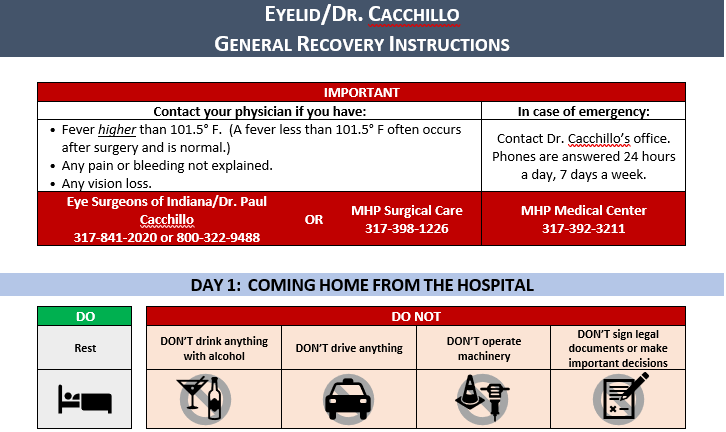
Medications:
- You can take all your medicines that you were taking before your procedure. Do NOT drink alcohol before, during, or after the surgery while taking pain medication.
- Also take the new medications you were given after your procedure. Be sure to follow the instructions for how to take your medicines. These instructions usually include what time of the day to take your medicines and whether to take them during a meal or on an empty stomach.
- For Pain: It is OK to take Tylenol (acetaminophen) or Advil (Ibuprofen) for mild pain. If this is not enough, you may take of your prescribed pain medicine as directed. DO NOT take Tylenol (acetaminophen) at the same time as taking your prescription pain medicine.
- For Constipation: Prescription pain medicines frequently cause constipation. This means it can be hard to use the restroom. You may take over-the-counter stool softeners to help prevent this problem.
- For Birth Control: Certain birth control products work by changing body chemicals called hormones. Some examples include Birth Control Pills, Skin Patches, Implants, and certain IUDs. The medicines you may have received while in the hospital can stop those birth control products from working. To avoid getting pregnant, use an additional birth control product that does not affect your hormones. Some examples include condoms and spermicides. Use these additional products for the next 31 days if you wish to avoid becoming pregnant.
Eating and Drinking:
- Resume usual diet as tolerated. Start with liquids first, if you aren’t nauseated, you may advance your diet. No alcoholic beverages today.
What to Expect During this Time:
- It is normal to have a slightly sore throat for a few days following your procedure. This should go away within 24-48 hours. You may use a throat lozenge or cough drop for temporary relief.
- Having surgery may cause temporary body aches, tiredness, nausea, and light-headedness. These should also go away within 24-48 hours after surgery.
- For your procedure, an IV was inserted into your arm or another part of your body. It is normal to see bruising where the IV was placed. If you have swelling or discomfort, a cold compress may be helpful. If you develop redness, warmth, or oozing where the IV was placed, please contact your physician.
- The medicines you received during your procedure may slow your ability to think and react. Do not drive anything, operate machinery, or sign important legal documents today.
- No showering today.

What to Expect During this Time:
- You may resume your usual diet and all medication immediately.
- A mild ache after surgery is normal. Please use Tylenol or Extra Strength Tylenol as instructed on label.
- Your incision may bleed a small amount for several days after your eyelid surgery. This is normal. The blood that comes through in the incision does not add to the bruise and allows you to heal faster.
- DO NOT strain or physically exert yourself for one week after eyelid surgery. As a guide, if you cannot comfortably speak during an activity, you are straining too much, and you should not perform that activity.
- You may take a shower/bathe normally the day after surgery. Please have someone assist you if you are not steady on your feet.
- A special ointment has been prescribed to you. You should apply a small amount of the ointment to your incision three times a day until your follow up appointment. This will keep the incision moist after surgery. You should gently pull down the lower lid and put a small amount of the ointment on the eyeball itself each night before you go to sleep. The ointment will help to keep your eyes moist and protected. Be careful walking after you put the ointment on your eyeball because the ointment will blur your vision. IF an eye drop was prescribed to you, gently pull down the lower lid and instill one drop four times a day until your follow-up appointment.
- Use cool compresses to minimize your swelling and bruising. You should use the cool compresses for 15 to 30 minutes of every hour while you are awake for the first 3 days after surgery. Do not keep the cool compress on for more than 2 hours straight.
- A nurse will call you in the next few days to discuss your recovery and answer any questions you may have. If you have questions before our nurse calls, please contact your physician or call MHP Surgical Care (317-398-1226) to speak with one of our nurses. After hours, you may call the MHP Medical Center (317-392-3211).